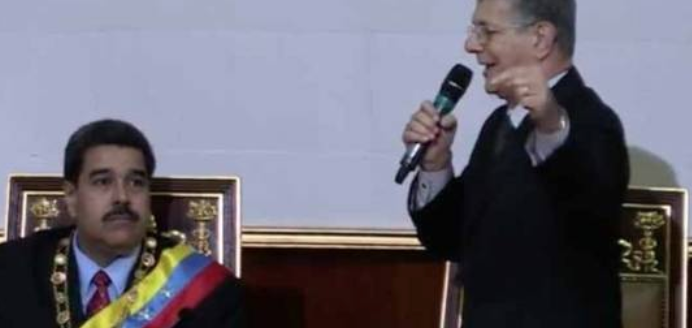[A couple of Venezuelan colleagues politely reminded me that Venezuela is not a federal republic. So the more appropriate translation of “memoria y cuenta” would be “State of the Nation.”]
1. That it happened at all was remarkable. President Nicolás Maduro’s actual speech in last night’s Memoria y Cuenta was for the most part unexceptional. It was a three-hour ramble repeating the arguments he makes almost daily about the economic war and imperialist treachery. But the fact that it happened at all and the way it happened was remarkable.
Only a couple of days prior it looked like Venezuela’s national government was headed to a constitutional crisis over the AN’s swearing in of three opposition deputies whose elections had been suspended by the Electoral Chamber of the Supreme Court (TSJ). Among the threats were that the TSJ would consider the AN’s laws to be null and that the Executive would bypass the AN completely, depending instead on the Constitutional Chamber of the TSJ. To the chagrin of opposition radicals who seemed to see this as the opportunity to launch La Salida II, Henry Ramos Allup backed off from the measure. This opened the way for what we saw last night.
Having Maduro come to the AN to give his State of the Nation, having the opposition majority behave during his speech, having Ramos Allup exercise the right of response, and having Nicolas Maduro and the Chavista minority sit through it until the end, was a victory for Venezuelan democracy.
2. Exercising the right of response was a milestone. It is worth reflecting a little further on just how important it was that Henry Ramos Allup was able to exercise the democratic right of response for the first time during the Chavista period. Beyond the content of what he said, the fact that he could stand there and criticize Maduro’s speech to his face on live national television seems to me a turning point.
In her book on Syria under Bashar al-Assad, Lisa Wedeen emphasizes the importance of omnipresence as a form of disciplinization of political discourse. She argued that in pre-civil war Syria it did not matter that most people did pay much attention to the content of what Assad said, the simple omnipresence of his image, symbols and speeches was enough to restrict discussion. In most ways I do not think Venezuela under Chavismo is anything like Syria under Assad. But the omnipresence of Chavismo on the airwaves and in spaces of power has long given it a sense of inevitability that reduces dissent and the imagination of alternatives.
Of course the opposition has had some presence in the National Assembly all along and has been able to raise its voice. But the AN has been controlled by Chavista authority who sets the time and the agenda, and could always dismiss opposition initiatives and arguments, making them look like an irrelevant and outdated minority. The right of response, carried out as a counter-spectacle on live national television will certainly have an impact on people’s sense of possibility.
The content of what HRA said was also important. He debunked the increasing tendency of Chavismo to absurdly blame the opposition demonstrators for all 43 deaths in the 2014 protests. He criticized the economic model of the past seventeen years, and said that the housing built buy Misión Vivienda could not be treated like Chavista subdivisions. He was also able to defend the various aspects of his first ten days as AN president, including having taken down the images of Chávez and Bolívar.
And as if to remind us that Henry’s no angel, Ramos Allup explained in his response that he was actually just aiming to replace the image of Bolivar in the AN arguing that “for us” Bolívar is the classic image painted by José Gil de Castro, not the “Bolivar amulatado” (i.e. mixed race) created by Chavez. The turn of phrase and battle over Bolívar’s image underline the deep divisions of race and class that are present in Venezuela’s political conflict.
3. Doubling Down on the Economic War. Maduro’s speech, like the Economic Emergency Decree the same day showed him to be doubling down on his economic policy. Maduro reviewed the well known tenets of his “economic war” explanation of Venezuela’s economic catastrophe: “induced” inflation, speculation, hoarding and an international conspiracy against oil prices. Compared to last year’s Memoria y Cuenta there were even fewer concrete economic announcements. He again mentioned raising gasoline prices. But he did not express any intention of addressing Venezuela’s wild foreign exchange distortions.
The economic decree released earlier in the day provides no concrete measures, instead simply giving the Executive more discretion to intervene in the economy. Analysts suggest Maduro knows the AN will not approve it and seeks to use it to blame the opposition AN for the coming economic meltdown.
4. Proposal for a National Justice, Truth and Peace Commission. Maduro’s most interesting suggestion of the night was that there needed to be a commission led by someone of recognized character that could investigate the events of 2014 and push forward a peace process. This is a suggestion with significant potential and the opposition needs to take it seriously. The opposition’s list of people it wants to receive amnesty includes questionable alongside valid cases and will likely be divisive. It is not clear, for example, what their argument is for the release of someone like Lorent Saleh, a former student leader who was videotaped discussing plans for violent attacks in Venezuela.
This is not to say such a commission would necessarily be successful. It is a little hard to imagine the government participating in a discussion that revisits the Leopoldo López case when he was just sentenced in September and the presiding judge Susana Barreiros has become the new star of Chavismo. Nevertheless, Maduro’s suggestion should be treated as an opening on the issues of justice and reconciliation.



